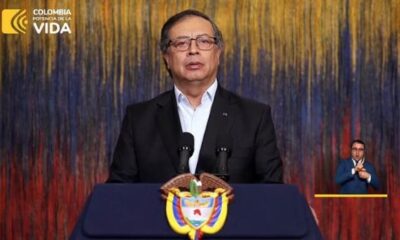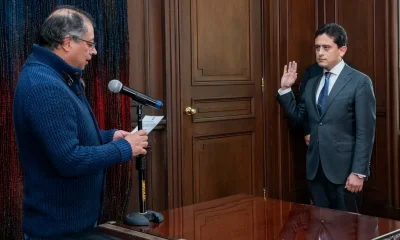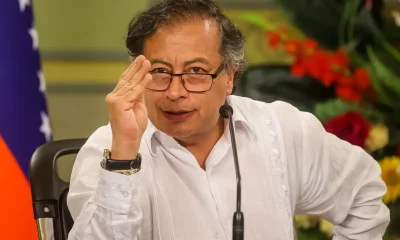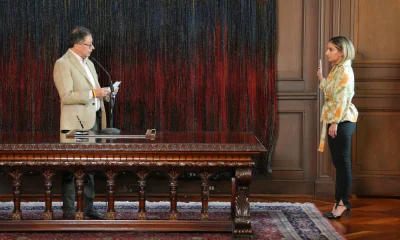International
Petro opens an unexpected debate in Colombia with his proposal for a constituent assembly
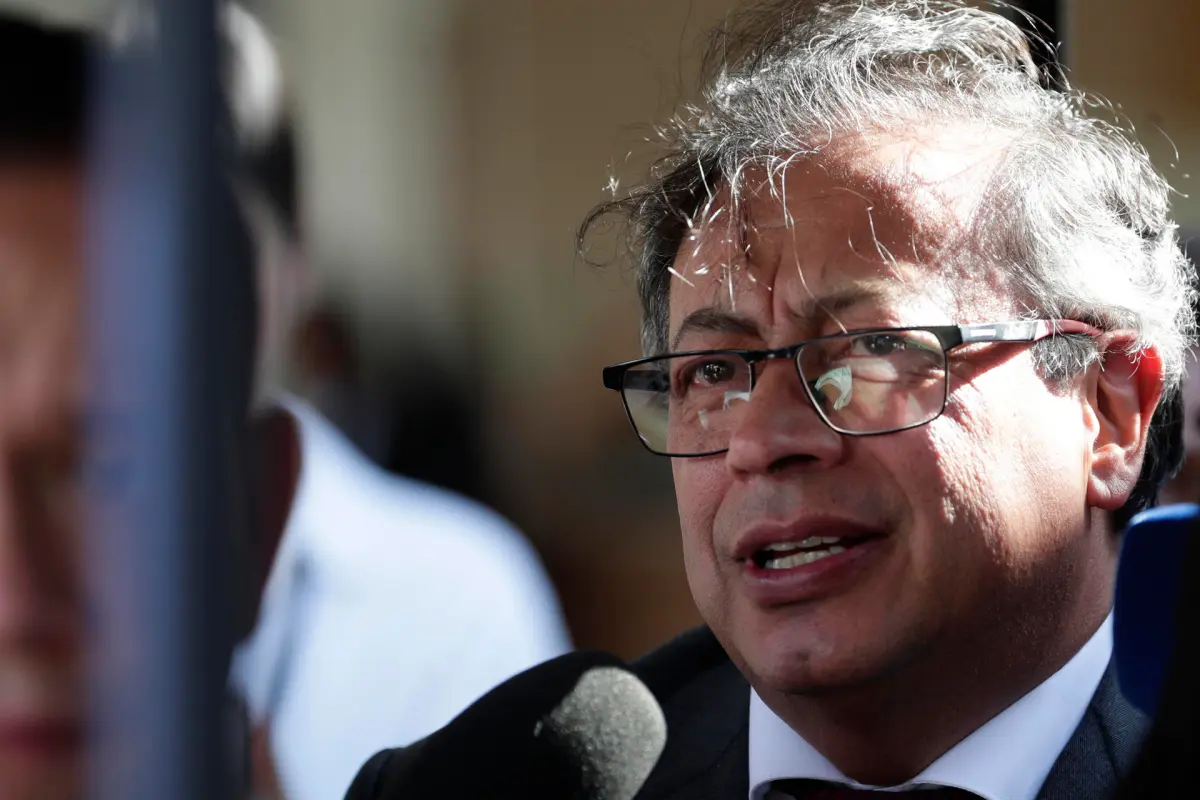
An unexpected debate on the Constitution opened in Colombia with the proposal of President Gustavo Petro to convene a national constituent assembly in the face of the difficulty of getting Congress to approve its reforms.
This was recognized this Saturday by the president himself on the social network X where he referred to the proposal he presented on Friday in Cali (southwest), which has been criticized by politicians of all currents, including some who supported him in the presidential elections of 2022.
“The proposal of the Constituent Assembly will unleash a national debate. It’s good that it is so,” said the president when sharing the speech in which he made the controversial announcement, described as a “globe” of distraction by various sectors because Petro’s legislative and popular support is diminishing.
According to former left-wing senator Jorge Robledo, Petro’s idea of a constituent only seeks to distract “because he does not have enough votes to approve it in Congress or to approve it among the citizens.”
“That he mentions it, rather than proving his political strength in Colombia, what he demonstrates is his weakness,” Robledo said in X, and assured that Petro’s maneuver is a sign of “despair.”
On Friday, at an event in Puerto Resistencia, a sector of Cali that was the epicenter of the 2021 social protests, Petro argued that the constituent national assembly is necessary if the institutions that the country has “are not able to live up to the reforms” proposed by his Government and that are bogged down in Congress.
The protests were the starting point of the nonconformity that led Petro to win the 2022 elections and in them, the protesters, mostly young people, demanded profound social changes in the country, a flag that the current president took.
Petro’s statement has not been received by politicians, who consider it impertinent to change a Constitution that was promulgated in 1991 and in the drafting of which the demobilized of the M-19 guerrillas, of which the current president was a part, participated, among others.
Senator Humberto de la Calle, a member of the Esperanza Center Coalition and who was the only representative of the Executive in the National Constituent Assembly of 1991, described the president’s argument as “weak.”
“The cause that the president alleges to convene a constituent is the impossibility of complying with the Constitution, according to his own saying (…) If it were true, it is not the Constitution that must be changed but the way of governing,” the congressman added in a statement.
De la Calle recalled that to approve a constituent, a bill is required, which must go through a Congress in which Petro no longer has majorities, and “two calls to the people,” first to say if he wants a constitutional reform and, if so, to approve any changes.
The president was reminded on social networks of a campaign promise he made in 2018 when he allied himself with a faction of the Green Alliance party – led by the former mayors of Bogotá Antanas Mockus and Claudia López – not to convene a constituent.
In the photo, today’s president appears carrying a marble plaque in which he signed a decalogue of commitments in case he wins the elections, which he ended up losing with the Uribe Iván Duque.
The second point said: “I will not convene a constituent assembly.”
Claudia López, who was mayor of Bogotá between 2020 and 2023, said in X: “Gustavo Petro deceived Colombia, ended his incapable government, and decided to devote himself to chaos, the distribution of subsidies and polarization. Serenity and firmness Colombia. In democracy we will protect the Constitution of ’91, which was the result of a national and citizen agreement.”
“It does not have a majorities even to approve an ordinary Law, much less to convene a Constituent Assembly. He knows it, but he says it to sow chaos, division and polarization that are the tools with which he will maneuver the remaining period. Gustavo Petro doesn’t care about change, the people, the economy, security, or the country. The only thing that matters to him is to feed his vain megalomania,” he added.
Analyst León Valencia, director of the Peace & Reconciliation Foundation (Pares), assured that he understands “Petro’s frustration” because “social reforms, as necessary as they are urgent, do not advance” and “the resistance of the traditional elites is enormous.”
However, he considered that “perhaps the environment is not there to embark on a constituent process.”
“The best thing is to go to the presidential faculties to make the possible changes through decrees and directives and concentrate efforts on executing the approved development plan and advancing peace with the ELN (National Liberation Army),” Valencia added.
International
U.S. Senate Rejects Budget, Bringing Government Closer to Shutdown Amid DHS Dispute

The U.S. Senate voted on Thursday against a budget proposal in a move aimed at pressuring changes at the Department of Homeland Security (DHS), following the killing of two civilians during a deployment of immigration agents in Minneapolis.
All Senate Democrats and seven Republican lawmakers voted against the bill, which requires 60 votes to advance, pushing the country closer to a partial government shutdown that would cut funding for several agencies, including the Pentagon and the Department of Health.
The rejection came as Senate leaders and the White House continue negotiations on a separate funding package for DHS that would allow reforms to the agency. Proposed measures include banning Immigration and Customs Enforcement (ICE) agents from wearing face coverings and requiring them to use body-worn cameras during operations.
The vote took place just hours after President Donald Trump said he was “close” to reaching an agreement with Democrats and did not believe the federal government would face another shutdown, following last year’s record stoppage.
“I don’t think the Democrats want a shutdown either, so we’ll work in a bipartisan way to avoid it. Hopefully, there will be no government shutdown. We’re working on that right now,” Trump said during a Cabinet meeting at the White House.
International
Trump Says Putin Agreed to One-Week Halt in Attacks on Ukraine Amid Extreme Cold

U.S. President Donald Trump said on Thursday that he secured a commitment from Russian President Vladimir Putinto halt attacks against Ukraine for one week, citing extreme weather conditions affecting the region.
“Because of the extreme cold (…) I personally asked Putin not to attack Kyiv or other cities and towns for a week. And he agreed. He was very pleasant,” Trump said during a Cabinet meeting broadcast by the White House.
Trump acknowledged that several advisers had questioned the decision to make the call.
“A lot of people told me not to waste the call because they wouldn’t agree. And he accepted. And we’re very happy they did, because they don’t need missiles hitting their towns and cities,” the president said.
According to Trump, Ukrainian authorities reacted with surprise to the announcement but welcomed the possibility of a temporary ceasefire.
“It’s extraordinarily cold, record cold (…) They say they’ve never experienced cold like this,” he added.
Ukrainian President Volodymyr Zelensky later commented on the announcement, expressing hope that the agreement would be honored.
International
Storm Kristin Kills Five in Portugal, Leaves Nearly 500,000 Without Power

Storm Kristin, which battered Portugal with heavy rain and strong winds early Wednesday, has left at least five people dead, while nearly half a million residents remained without electricity as of Thursday, according to updated figures from authorities.
The revised death toll was confirmed to AFP by a spokesperson for the National Emergency and Civil Protection Authority (ANPEC). On Wednesday, the agency had reported four fatalities.
Meanwhile, E-Redes, the country’s electricity distribution network operator, said that around 450,000 customers were still without power, particularly in central Portugal.
Emergency services responded to approximately 1,500 incidents between midnight and 8:00 a.m. local time on Wednesday, as the storm caused widespread disruptions.
The Portuguese government described Kristin as an “extreme weather event” that inflicted significant damage across several regions of the country. At the height of the storm, as many as 850,000 households and institutions lost electricity during the early hours of Wednesday.
Several municipalities ordered the closure of schools, many of which remained shut on Thursday due to ongoing adverse conditions.
Ricardo Costa, regional deputy commander of the Leiria Fire Brigade, said residents continue to seek assistance as rainfall persists.
“Even though the rain is not extremely intense, it is causing extensive damage to homes,” he noted.
In Figueira da Foz, a coastal city in central Portugal, strong winds toppled a giant Ferris wheel, underscoring the severity of the storm.
-

 Central America3 days ago
Central America3 days agoGuatemala seizes over a ton of cocaine hidden in flour at Pacific port
-

 International4 days ago
International4 days agoDelcy Rodríguez seeks political agreements after Maduro’s ouster
-

 International3 days ago
International3 days agoHistoric snowstorm paralyzes Toronto after 60 centimeters of snow
-

 International3 days ago
International3 days agoSpain’s irregular migrant population rises to 840,000, study finds
-

 Central America2 days ago
Central America2 days agoGuatemala Police Arrest Prison Guard Caught in the Act of Extortion
-

 Central America2 days ago
Central America2 days agoHonduras swears in conservative president Asfura after disputed election
-

 International4 days ago
International4 days agoFederal immigration agents kill man in Minneapolis, sparking protests and outrage
-

 International1 day ago
International1 day agoFootball Fan Killed in Clashes After Colombian League Match
-

 Central America2 days ago
Central America2 days agoBukele leads public trust rankings as UCA survey highlights gains in security
-

 International2 days ago
International2 days agoWinter Storm Fern Leaves 30 Dead and Over One Million Without Power Across the U.S.
-

 International2 days ago
International2 days agoDoomsday clock moves to 85 seconds before midnight amid rising global risks
-

 Sin categoría2 days ago
Sin categoría2 days agoEight Killed in Series of Armed Attacks in Ecuador’s Manabí Province
-

 International3 days ago
International3 days agoRights group says nearly 6,000 killed in Iran protest crackdown
-

 International1 day ago
International1 day agoMissing Spanish Sailor Rescued After 11 Days Adrift in Mediterranean
-

 International1 day ago
International1 day agoRubio Says U.S. Could Participate in Follow-Up Russia-Ukraine Talks
-

 Central America1 day ago
Central America1 day agoGuatemala President Says Starlink Terminal Found Inside Prison
-

 International2 days ago
International2 days agoSpain approves plan to regularize up to 500,000 migrants in Historic Shift
-

 Sin categoría2 days ago
Sin categoría2 days agoEl Salvador Launches Fourth Year of Ocean Mission to Protect Marine Ecosystems
-

 International3 days ago
International3 days agoVenezuela frees at least 80 political prisoners, NGO says
-

 International3 days ago
International3 days agoEU launches new probe into X over AI-generated fake nude images
-

 International3 days ago
International3 days agoSevere winter storm grips U.S., leaves multiple dead as extreme cold persists
-

 International3 days ago
International3 days agoFrance debates ban on social media for children under 15
-

 International2 hours ago
International2 hours agoMan Arrested After Vehicle Crashes Into Jewish Institution in Brooklyn
-

 International2 hours ago
International2 hours agoU.S. Senate Rejects Budget, Bringing Government Closer to Shutdown Amid DHS Dispute
-

 International2 hours ago
International2 hours agoStorm Kristin Kills Five in Portugal, Leaves Nearly 500,000 Without Power
-

 International2 hours ago
International2 hours agoTrump Says Putin Agreed to One-Week Halt in Attacks on Ukraine Amid Extreme Cold





























